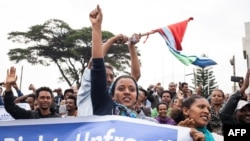"The human rights situation in Eritrea remains dire and shows no signs of improvement. It continues to be characterised by serious human rights violations," the UN's Deputy High Commissioner for Human Rights Nada Al-Nashif said.
"Eritreans continue to be subjected to indefinite military/national service, which intensified following the Tigray conflict" in northern Ethiopia, Al-Nashif said in a report presented to the Human Rights Council in Geneva.
One of the most closed and authoritarian countries in the world, Eritrea has been ruled with an iron fist by President Isaias Afwerki since its independence from Ethiopia in 1993.
During a rare press conference during a visit to Nairobi, Isaias rejected allegations of rights abuses by Eritrean troops in Tigray, dismissing the accusations as "fantasy."
Eritrean troops supported Ethiopian government forces during the two-year war against the Tigray People's Liberation Front (TPLF) and have been accused of brutal atrocities against civilians.
A peace agreement signed in November called for the pull-out of foreign forces, but there was no specific mention of Eritrea, whose troops continue to be present in parts of Tigray, according to residents who accuse the soldiers of murder, rape and looting.
"The withdrawal remains very slow and largely incomplete," the UN report said.
"Our office continues to receive credible reports of torture; arbitrary detention; inhumane conditions of detention; enforced disappearances."
"It is alarming that all these human rights violations are committed in the context of complete impunity," the report said, pointing to a "total lack of cooperation" from the authorities in the Horn of Africa nation.
Asmara was sanctioned by the United States for committing atrocities during the Tigray conflict, including the massacre of hundreds of civilians.
Estimates of casualties from the brutal conflict vary widely, with the African Union's envoy to the Horn of Africa, Olusegun Obasanjo, saying that the death toll could be as high as 600,000.
Human Rights Watch last month called for fresh sanctions against Eritrea, accusing it of rounding up thousands of people, including minors, for mandatory military service, during the Tigray war.






